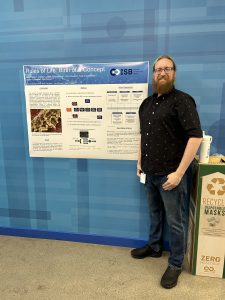Transferring In: Student Profile with John Plinka
What brought you to UW, and the Marine Biology program specifically?
The idea of doing very technical science while keeping an eye on the social impact of modern society has been a driving thought in my head throughout my whole college education so far. I received my Associate degree from Tacoma Community College, and the reputation of both UW and the Marine Biology program was a powerful motivator for me to come here. I’d heard about it from alumni, but it’s also got the reputation of being at the forefront of the intersection of social consciousness and scientific advancement, and that sealed the deal.

I’m entering my senior year and majoring in Marine Biology with a minor in Environmental Studies, and what is really driving me is visualizing current scientific techniques for educating the next generation. When I was a kid growing up in Jacksonville, Florida, I vividly remember visiting the Museum of Science and History and interacting with their hands-on displays which were engaging and exciting. That’s what I want to do for other kids: get them excited about science. And a project I’m working on now that is a continuation of my capstone project at Tacoma Community College is the dynamic modeling of kelp forest habitat. I want to take into account anthropogenic climate change, sustainable fishing practices, things like that, and have it in a workable way to present to high school and middle school kids, to engage them in questions of how it all connects.
What has been a highlight of your time so far at UW?
I transferred into the Marine Biology program in Winter 2024, after starting back at college in Autumn 2021. I’m approaching one year here, and it’s been a whirlwind so far. A standout experience for me in my first year was being on the narwhal mystery booth at the SAFS Open House, where I got to teach youths about the so-called sea unicorns!
As a transfer student, what has this experience been like for you?
For me, there’s definitely been a benefit coming in as an older student, who has already had some life experience in different ways. I’m an Army Veteran, and worked for a while as a bartender, and so I’m good at building networks quickly, which is very useful as a transfer student. One thing I’ve found is that by being honest about where I’m at in my education journey – being new to this whole thing – people are very responsive and helpful where they can.

As a transfer student there is so much information – a lot of it very important – that you have to take in on a crunched timescale when you join the program, and so accepting this and being honest with other peers, TAs and teachers about where you’re at, is advice I would give to others. Don’t shy away from standing out, it can work in your favor.
I should also highlight that my experience is different to a lot of younger students transferring into the program. I’m focused on building professional networks, not necessarily social ones, so I can’t speak to that aspect. I’ve also found myself falling naturally into leadership roles because I am a bit older than your average student, but this has an added benefit of crystal clarity in my education journey: I know where I want to go, who I want to be, and can utilize the answers of people around me to get there.
My main bit of advice for transfers: feeling lost is OK. Be willing to embrace that as it means you’re probably doing it right – this is one of the busiest and hardest times of our lives. But saying that, don’t be afraid to talk to your teachers and let them know what’s going on, they’re very supportive.
What is the goal in say, 5-10 years’ time?

Grad school is my next step. I’ve been able to speak with a lot of people in other UW grad programs, and continuing research is the right choice for me. That will likely take me another 5-7 years once I graduate, and after that I would like to apply my education to some form of community education or policy advisement. The goal is to take this body of knowledge, that will have taken me a decade to build up, and directly apply it to the world.
I recently found out that I enjoy data science, so scientific data management or analysis may be my path for grad school. A topic that I find really interesting – kelp forests – is related to my favorite animals: otters. Kelp forests and otters are intrinsically linked. My love of otters is what drives me but knowing that I can answer the questions around otter conservation at the foundational level by delving into the health of kelp forests is very motivating. One specific area of interest for me is mapping the microbiomes of kelp forests in Puget Sound, which can be used for climate change analysis, and how changes in the microbiome coincide with the macrobiome.